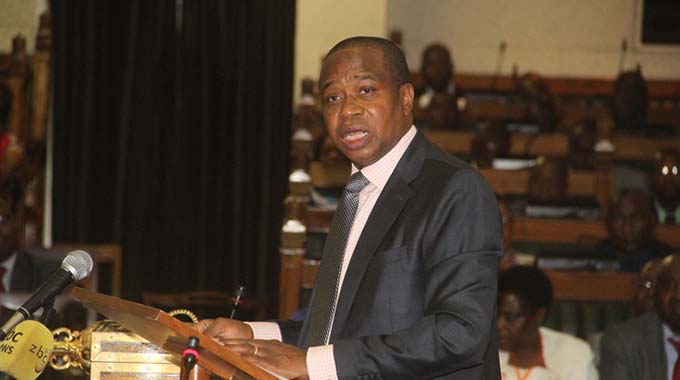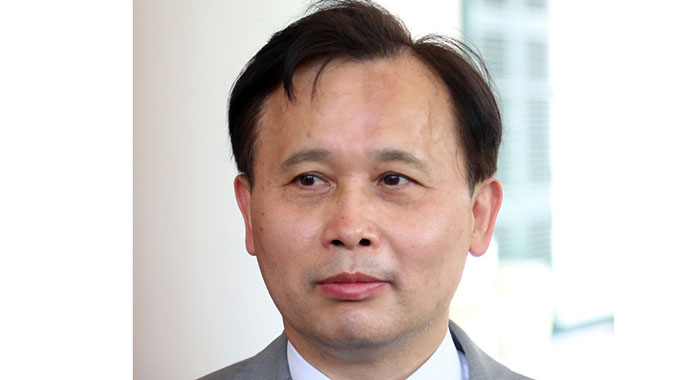Laying the foundation for triple ‘S’ growth – Strong, Sustainable and Shared

The politics of Mthuli Ncube’s economics
Tichaona Zindoga and Davidson Kaiyo
When Professor Mthuli Ncube was appointed Zimbabwe’s Finance Minister in September, he was one of the surprise packages of the new Cabinet as he was hailed as a technocrat and an astute banker with international experience.
His CV was impressive: previously chief economist and vice president of the African Development Bank and dean and professor of finance at Wits Business School in South Africa.
Dean of the Faculty of Commerce, Law and Management at the University of the Witwatersrand (Wits) as well as a lecturer in finance at the London School of Economics.
He has published a number of award-winning papers in the area of finance and economics as well as four books, namely, Mathematical Finance; South African Dictionary of Finance; Financial Systems and Monetary Policy in Africa; and Development Dynamics: Theories and Lessons from Zimbabwe; and a book manuscript on Finance and Investments in South Africa.
He was the owner of the now defunct Barbican Bank.
With his background, there was a sense that technocracy in President Mnangagwa’s Cabinet – economics in Prof Ncube’s case – would counter the politics.
Yet, Prof Mthuli’s boss, President Mnangagwa, actually had a unique approach wherein his Finance Minister would nicely fit in: he introduced the paradigm of “more economics and less politics”, whose variant is “politics with economics”.
Presenting his maiden Budget on Thursday, Prof Ncube showed that he was pursuing this doctrine.
He has just been given room to pursue his economics – and he started his journey of “Austerity for Prosperity” as an economic philosophical paradigm.
He seasoned his presentation with anecdotes on austerity, the face of whom is former British prime minister Margaret Thatcher.
Just as President Mnangagwa has made it clear that there is no alternative but the path of spending cuts. In an article published in the Financial Times last week, he primed us for this Mthuli moment.
From devolution to civil service bonus
The most notable aspects of Prof Ncube’s politics in this Budget is that he followed the spirit of President Mnangagwa on major aspects both domestically and internationally.
On the domestic front, the Finance Minister displayed pragmatism and shied away from populism, which is the basis of the austerity measures underlining his policy and echoing President Mnangagwa’s call for Zimbabweans to brace for tough decisions that will heal the economy.
He provided for policies such as devolution, to which he committed 5 percent of central Government revenue collections for distribution to provincial and local tiers, in line with the constitutional provision under Chapter 14 on devolution. Devolution is such a big political issue of the Second Republic.
Other key areas show the minister’s delicate balancing act. These include agriculture funding and youth empowerment and capacitation. It is on the issue of the Budget that the Finance Minister showed one of his key pragmatic moments. He ensured a compromise to pay bonus based on basic only, “Understanding the politics of the civil service as the drivers of the Vision 2030”. Tied to this are two important decisions to retire the “contentious youth officers” as a “departure from the old” and retiring civil servants above 65. This was a huge political call.
It had to be done, and the Finance Minister bit the bullet.
Prof Ncube took a liberal approach to politics where he emphasised such aspects as good governance and justice; respect of property rights, corruption, as well as transparency and accountability.
His approach takes the colour of Western values and has an eye, no doubt, on impressing the world on Zimbabwe’s reform agenda.
He said: “Good governance backed by effective, responsive and progressive institutions is at the heart of a developing and prosperous country. In recognition of this, the New Dispensation has been promoting a series of political, economic and social changes to transform all governance systems for a better Zimbabwe. The 2019 Budget will, therefore, target capacitation of those constitutional institutions mandated to promote democratic principles.”
Politics of re-engagement and globalisation – with finance
The 2019 Budget will support Zimbabwe’s external politics, that is, its diplomacy and external relations. However, Prof Ncube is not just going to throw money around.
“As much as we desire to implement and launch our re-engagement programme on all fronts,” he said, “the capacity of our Budget demands some review to align support levels within means.”
He noted the Foreign Affairs bill, of around US$65 million, was huge and proposed the number of Foreign Service missions be reduced from 46 to 38, thereby optimising the utility value realised from the remaining missions as well as avoiding accumulation of arrears and embarrassing evictions of our diplomats.
Prof Ncube recognised that since last year, one of the major aims of the Second Republic was to bring the country back into the global village through re-engagement and one of the strategies is debt clearance.
On the other hand, Zimbabwe lost more than a decade of globalisation dividends through international isolation, depriving the local market of the much needed access to international capital markets, technology, trade spin-offs, among others, perpetuating low economic growth and standards of living, as well as poverty.
This will entail funding for the purposes of actively re-engaging the international community on both political and economic fronts, particularly paying more attention to promotion of investment, trade and tourism by marketing Zimbabwe as a destination of choice. According to the Finance Minister, Government will craft and adopt domestic policy priorities that translate into foreign policy goals to facilitate re-engagement with the international community, especially the Commonwealth, United Nations and Western countries.
“Zimbabwe is Open for Business”. Economic diplomacy. Do they ring a bell? Definitely, because these have been some guiding principles in President Mnangagwa’s policies since this time last year when he assumed office after Operation Restore Legacy.
Mthu ado about something – and brace up!
No doubt that this Budget was long awaited because of the economic uncertainties that have been witnessed in Zimbabwe over the past few months.
The remarkable thing is that there is convergence between the minister and the President as to where the country ought to go and the path it will take, the overarching theme being austerity. There is no other way!
The semiotics between the two men is critical. They are men walking together. Prof Ncube’s Transitional Stabilisation Programme underlines his approach to economics whose goals, objectives and goals resonate with President Mnangagwa.
TSP’s immediate objective is macro and fiscal stabilisation and laying a solid foundation for attaining the triple “S” growth – strong, sustainable and shared. This growth will be anchored on good governance and promotion of democratic principles, equitable access to means and outcomes of production, as well as modern infrastructure that supports day- to-day socio-economic activities.
Further, strong, sustainable and shared growth will enable Zimbabwe to achieve efficient delivery of public services and the restoration of Zimbabwe’s rightful place in the region and global economy.
If this remains consistent and constant, Zimbabwe will witness a change of fortunes in the next few years.
Already, President Mnangagwa has set sights on Zimbabwe achieving upper middle income status status by 2030.
Yet, it’s not going to be easy.
Quoting John Stuart Mill, Prof Ncube offers counsel that Zimbabweans ought to internalise: “I have learned to seek my happiness by limiting my desires, rather than in attempting to satisfy them”.










Comments